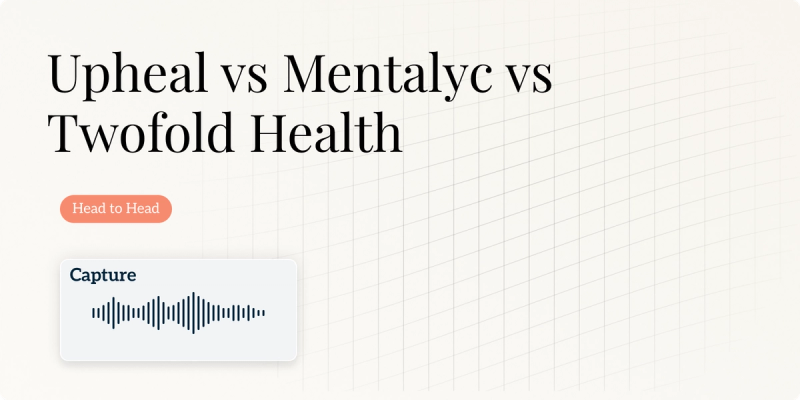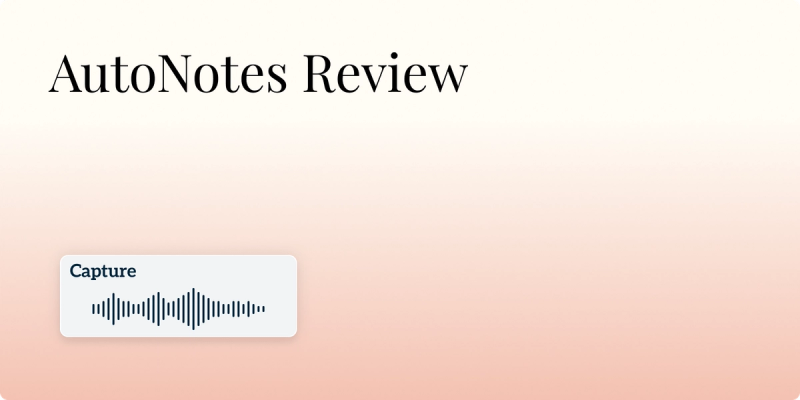
Upheal vs Mentalyc vs Twofold Health — a detailed, 2026 ‑ready guide

Key Takeaways
all three will speed up documentation—but if you want predictable pricing, HIPAA‑grade privacy choices, flexible capture modes (including telehealth with headphones), SMART treatment planning that preserves the golden thread, and an AI‑assistant that helps with progress tracking and homework ideas, Twofold Health may be the better choice for most practices.
TL;DR (what actually matters in daily practice)
- Clinical continuity (the “golden thread”)
- Upheal formalized “Golden Thread” treatment plans that link notes to goals, with a compliance checker (Premium).
- Mentalyc markets golden‑thread continuity as well.
- Twofold keeps narrative continuity by analyzing sessions against your plan and carries goals/diagnoses forward so the golden thread stays intact with SMART treatment plans.
- Capture methods
- Upheal’s Free plan allows dictation, text‑to‑note, and uploads, but not live session capture; telehealth with AI notes and other live options come with paid tiers.
- Mentalyc supports live listening, uploads, dictation, and typed summaries across plans (note caps vary by tier).
- Twofold supports four ways out of the box- capture the full session, dictate a summary, type text input, or upload a recording - and also supports uploading handwritten notes.
- Telehealth specifics
- Upheal has integrated telehealth, but its own calling platform doesn’t yet support couples/family sessions (Zoom and other capture methods are fine).
- Mentalyc offers an in‑app recorder and works alongside Zoom; note that clients are not notified when you record with Mentalyc’s recorder during a Zoom call (you must handle consent).
- Twofold uniquely documents telehealth‑with‑headphones capture in Chrome (so you can keep your calls private on a headset and still generate a note).
- Privacy posture
- Upheal provides a BAA, SOC 2, default deletion of recordings when used, and an opt‑out for de‑identified training.
- Mentalyc offers a BAA, SOC 2 Type II, stores audio up to ~3 days before deletion, and advertises de‑identified transcripts.
- Twofold provides a signed BAA at signup and emphasizes no audio retention after processing.
- Pricing shape
- Upheal: Free (unlimited notes without live capture); Starter starts around $19/mo (annual); Premium $69/mo (annual) for advanced features like treatment planning and analytics.
- Mentalyc: tiered note caps, e.g., 40/100/160/330 notes per month on annual Mini/Basic/Pro/Super; Team “unlimited” subject to fair use.
- Twofold: $49/mo (annual) with unlimited notes and treatment plans included; group plans offer org‑wide BAA.
Category | Upheal | Mentalyc | Twofold Health |
|---|---|---|---|
Pricing model | Unlimited, features gated by tier | Capped (40–330/mo) | Unlimited flat price |
Audio retention | Deleted by default | ~3-day temporary retention | No audio stored |
BAA | Available | Available | At signup |
Golden-thread SMART plans | Yes (Premium) | Yes (tiered) | Yes + carried forward |
AI-Assistant (progress, homework, supervision) | Yes | ||
Telehealth specifics | Built-in; couples/family not yet | Works w/ Zoom; manual consent | Headphone-friendly workflow |
Custom templates (structure, style, tone) | Limited by tier | Many templates (tiered) | Full control |
Languages | 8 listed | Not clearly published | 30+ supported |
Capture modes | Dictate/Text/Upload (Free); more on paid | Live/Upload/Dictate/Type | 4 ways incl. handwritten upload |
Scalability | Solo, Team | Solo, Small Clinics | Solo, Group, Enterprise |
Support/Onboarding | Email, Tiered training | Vendor Support | Email/chat support; onboarding guides |
Device/Platform Support | Web,iOS; Android TBD | Web, Zoom | Web, iOS, Android; desktop-friendly |
Last verified January 2026
Deep‑dive analysis
1) Treatment plans & the golden thread (audit resilience)
- Upheal: Golden Thread is a first‑class feature, treatment plans are AI‑generated and tied into progress notes, and a Compliance Checker helps align to payer expectations (Premium). This is well thought‑out for audits.
- Mentalyc: Positions SMART treatment planning, progress tracking, and golden‑thread continuity across comparison pages and blog content. However, specifics of payer‑focused compliance tooling aren’t as clearly documented as Upheal’s named checker.
- Twofold: Twofold’s SMART treatment plans feed directly into subsequent notes; goals and diagnoses carry forward to preserve continuity, the practical essence of the golden thread. In practice, this means fewer manual linkages and fewer denials tied to narrative gaps.
Our take: If your priority is golden‑thread continuity without juggling add‑ons or higher tiers, Twofold’s built‑in SMART plans plus continuity logic are the most straightforward path.
2) How you’ll actually capture sessions (and what’s gated)
- Upheal: The Free plan is generous (unlimited notes) but does not include live session capture; it’s dictation, text, and uploads only. Telehealth and richer capture options show up on paid plans. That’s a workable entry point - but your workflow may change when you move to couples/family or want ambient capture.
- Mentalyc: Flexible capture modes (live listening, upload, dictation, typed). Just track the note caps - 40/100/160/330 per month, depending on tier -so you don’t get squeezed mid‑month.
- Twofold: Four capture paths - full session, dictate, type, upload - plus an explicit workflow for uploading handwritten notes (useful for post‑session cleanup) and clear, documented telehealth‑with‑headphones. There’s no cap on the paid plan.
Practical watch‑outs: If you rely on Zoom or your EHR’s telehealth, note that Mentalyc’s recorder on Zoom does not notify clients—you must handle consent explicitly. Upheal collects consents in‑app and provides HIPAA templates; Twofold provides consent templates and scripts.
3) Telehealth realities - headsets, couples, and family work
- Upheal: Integrated telehealth is a plus, but its own calling platform currently doesn’t support couples/family calls; you’ll use Zoom or other capture routes for those cases.
- Mentalyc: Works with in‑app recording and Zoom. As above, consent/notification is on you if you choose the Mentalyc recorder during Zoom.
- Twofold: Clear guidance for recording virtual visits while wearing headphones, so you keep audio private yet still capture the conversation. - handy for crowded clinics and shared workspaces.
4) Template depth and customization (what your note sounds like)
- Upheal: Custom sections and Smart Sections (Premium) provide composability. Good for power users, but plan‑gated.
- Mentalyc: Offers 100+ templates on higher tiers and supervision notes starting at Pro.
- Twofold: Robust Custom Templates let you design your own structure and control verbosity, style, and tone, not just the headings - so your voice stays consistent across SOAP, DAP, BIRP, MSE, H&P, etc.
5) Privacy posture and BAAs (what risk do you carry?)
- Upheal: BAA available; SOC 2; record‑level encryption; default deletion of recordings when used; ability to opt out of de‑identified training. Good transparency and policy surface.
- Mentalyc: BAA; SOC 2 Type II; stores audio up to ~3 days (for retries/fixes) then deletes; transcripts de‑identified by default. Risk is modest but not zero during the retention window.
- Twofold: BAA at signup; explicit “no audio stored after processing” posture is easy to operationalize (and explain to patients and compliance).
6) Language coverage (for multilingual clinics)
- Upheal lists eight languages (EN, ES, PT, DE, FR, IT, ZH, HI). Upheal
- Twofold documents 50+ supported languages (well over 30), configurable in Note Settings. That’s useful for immigrant health, bilingual family work, and outreach clinics. Twofold Help Center
(Mentalyc doesn’t clearly publish a language list across official pages; directories often show EN.) GetApp
7) Pricing & value - what your budget actually experiences
- Upheal: Free unlimited notes (without live capture), Starter ≈ $19/mo (annual), Premium ≈ $69/mo (annual) for advanced features like Golden Thread planning and analytics. Review carefully which features sit on which tier -especially session capture options and compliance tooling.
- Mentalyc: Predictable caps by tier (40/100/160/330 notes/month). For busy weeks, caps can create cognitive overhead (and potential overage/plan juggling).
- Twofold: $49/mo (annual) with unlimited notes on the paid plan -no per‑minute fees, treatment plans included, instant BAA -making month‑to‑month spend highly predictable as panel size fluctuates.
Vendor spotlights
Upheal - thoughtful Golden Thread + integrated telehealth (trade‑offs exist)
What stands out
- Golden Thread planning that links notes to goals; recent updates emphasize payer‑friendly documentation.
- Compliance Checker (Premium).
- Free tier is generous for dictation/text/upload workflows.
Watch‑outs
- Own telehealth platform doesn’t yet support couples/family; you’ll use Zoom/browser capture there.
- Treatment planning, analytics, and some customization are plan‑gated (Starter vs Premium).
Mentalyc - analytics flair and supervision‑style insights (mind the caps and recorder behavior)
What stands out
- Multiple capture modes; Supervision notes and advanced templates on higher tiers.
- BAA + SOC 2 Type II posture with de‑identification.
Watch‑outs
- Note caps by tier (40/100/160/330) create budgeting friction for full caseloads.
- Using Mentalyc’s recorder during Zoom: clients are not auto‑notified; you must handle consent workflows explicitly.
- Audio is retained up to ~3 days before deletion (helpful for retries, but still a retention window you must account for).
Twofold Health - why it frequently ends up the “default” choice in clinics
What stands out (beyond the basics):
- AI‑Assistant that can summarize recent sessions (progress tracking), propose homework ideas, and answer clinical/coding questions, useful across treatment and supervision contexts.
- SMART treatment plans with continuity: Twofold analyzes sessions against your plan, and carries goals/diagnoses forward to maintain the golden thread.
- Telehealth with headphones documented workflow (keep calls private on a headset, still capture notes).
- Custom Templates: build your own note types and control structure, styling, and tone/verbosity.
- 24/7 human support referenced across Twofold’s comparisons and blogs.
- Value: $49/mo (annual) for unlimited notes, treatment plans, and assistant features; BAA at signup; no audio retention after processing.
- Languages: 50+ supported (far beyond eight).
- Four capture modes, plus upload handwritten notes when that’s your fastest path to done.
Which should you pick?
Each product can work. But if you value:
- A single, predictable price with unlimited usage,
- HIPAA posture that minimizes data retention (easier to explain to patients),
- Headset‑friendly telehealth capture,
- SMART plans that keep the golden thread without extra juggling,
- An AI‑assistant that helps with progress tracking, homework, and supervision tasks, and
- 30+ languages plus true custom templating…
Then Twofold Health is typically the safer, simpler bet to evaluate first.
Final note on consent & compliance
Regardless of platform, confirm the BAA on signup and document your consent workflow, especially if using tools that don’t auto‑notify clients when recording (e.g., Mentalyc’s recorder on Zoom). Twofold provides consent templates/scripts; Upheal has consent collection within the app. This small operational detail is what keeps great AI tooling from creating policy headaches later.
Frequently Asked Questions
ABOUT THE AUTHOR
Dr. Eli Neimark
Licensed Medical Doctor
Reduce burnout,
improve patient care.
Join thousands of clinicians already using AI to become more efficient.

Mentalyc vs Upheal: Detailed comparison for 2026
Discover how Mentalyc and Upheal enhance therapy efficiency. Weigh their features, pros, and cons to find the right AI tool for your practice.

AI Scribe Discount: A Verified AI Medical Scribe Promo Code You Can Use Today
Looking for an AI scribe discount? Use Twofold’s AI medical scribe promo code TWOFOLD30 for $30 off annual plans—your verified ai scribe coupon code, plus pricing and features.

Autonotes AI Review: Detailed Review for 2026
Explore the features of Autonotes AI in medical scribing, assessing its efficiency and usability.

